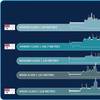Proposed Regulations Regarding Source From Activities in Intl. Waters
While U.S. citizens, resident aliens and domestic corporations are generally taxed by the United States on all of their worldwide income regardless of where such income is earned, the source of income remains important for such purposes as determining eligibility for the foreign tax credit. For nonresident alien individuals and foreign corporations doing business in the United States, only income derived from U.S. sources is normally taxable. Whether income is from sources within or without the United States is determined for U.S. tax purposes by a set of technical rules contained in Sections 861 through 865 of the Code.
The determination of the source of income from activities conducted in international waters is made under Section 863 of the Code (which also provides sourcing rules for certain transportation activities, space and ocean activities and international communications activities). In general, income from ocean activities conducted by a U.S. person is sourced to the United States, and income from ocean activities conducted by a non-U.S. person is sourced outside the United States. The new regulations alter this treatment in certain situations so that ocean activity income derived by a foreign person may now be sourced to and taxable in the United States. Definition of Ocean Activity. Prop. Reg. § 1.863-8(d)(1)(ii) provides that ocean activity is any activity conducted in international waters, with certain exceptions. Under the broad definition in the new regulations, ocean activity includes:the performance and provision of services;the leasing of equipment or other property located in international waters; the licensing of technology or other intangibles for use in international waters; the production, processing, or creation of property in international waters; the sale of property in international waters; the leasing of drilling rigs, the extraction of oil, gas and minerals and the performance and provision of services related thereto, to the extent the mines, oil or gas wells are in international waters; underwriting income from the insurance of risks on activities that produce income derived from ocean activity.
Ocean activity does not include any activity giving rise to transportation income, defined under Section 863(c) of the Code to mean income from the use, hiring or leasing of a vessel in connection with transportation that begins and/or ends in the United States.
Sourcing Income of U.S.-Owned Foreign Corporations. With respect to the source of income from ocean activities, the proposed regulations alter in two significant ways the general rule contained in the Code. First, Prop. Reg. § 1.863-8(b)(2) provides that if a foreign corporation is 50 percent or more owned by vote or value (directly, indirectly or constructively) by U.S. persons and is not a controlled foreign corporation, all income derived by the corporation from ocean activity is currently taxable as U.S. source income.
This proposed rule would prevent such U.S.-owned foreign corporations from sourcing income derived from ocean activities to sources outside the United States. More importantly, the new regulations adversely impact the controlled foreign corporation ("CFC") rules, making it much more difficult to delay U.S. taxation of the income of a U.S.-owned foreign corporation by intentionally adjusting the U.S. ownership structure to avoid CFC status.
Sourcing Income of Foreign Persons. Second, Prop. Reg. § 1.863-8(b)(3) provides that, if a foreign person is engaged in a U.S. trade or business, the foreign person's income derived from ocean activity is presumed to be U.S. source income. The regulations provide that if a foreign person can allocate gross ocean income between (1) income from sources within the United States or international waters, and (2) without the United States and international water to the satisfaction of the IRS, then income from without the United States and from international waters will be treated as foreign source income. The new regulations also provide that when a foreign person is entitled to the benefits of a tax treaty with the United States, the person may elect to be taxed under the rules of that treaty so that the United States would tax only income attributable to a permanent establishment of that foreign person in the United States.
Under these proposed regulations, a greater portion of a foreign person's shipping income is now exposed to potential U.S. taxation. In some situations it is possible that the United States will attempt to tax income that is only remotely connected to U.S. operations and that previously was not taxed in the United States.
The proposed regulations must be applied to determine the source of income from sales of property purchased or produced by the taxpayer when either the production or the sale occurs in international waters. The new rules are complicated and require quite technical income allocations. Similar rules are provided for sourcing income derived from the performance of services in international waters. The proposed regulations also provide new rules for sourcing the income of partnerships engaged in ocean activities, basically sourcing U.S. partnership income at the partnership level, and sourcing foreign partnership income at the partner level. We recommend that all persons engaged in the shipping, offshore oil and gas exploration and production, and cruise ship industries become familiar as soon as possible with the new regulations. Treasury regulations go into effect 30 days after the publication of final regulations, and final regulations are typically issued six months to one year after proposed regulations are issued. Taxpayers should seriously consider submitting comments to the IRS regarding the impact of the regulations, either individually or in conjunction with trade associations or other persons that will increase the impact of the comments.
Given their potential negative effect, the new regulations may warrant a substantial restructuring of the ownership of vessels engaged in the affected activities. Even though taxpayers are permitted to produce evidence rebutting the presumptions in the new regulations with respect to the source of income, such evidence must be "satisfactory" to the IRS. The uncertainties inherent in trying to determine what particular evidence may ultimately satisfy the IRS suggest that the better option is simply to alter the ownership of vessels and foreign corporations so that the new regulations are not applicable. Since a significant restructuring may prove time consuming, an examination of the potential impact of the new regulations on a particular company should begin as soon as possible.














